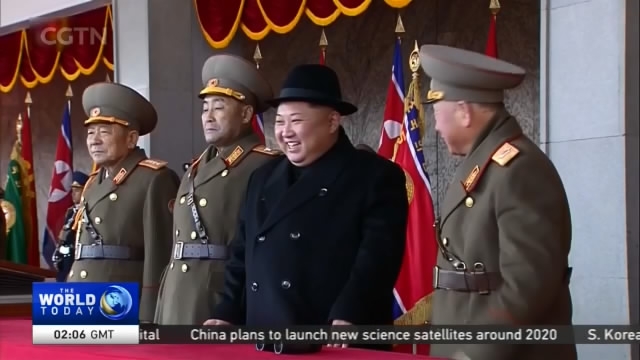
10:37, 25-Apr-2018
Inter-Korean Summit: Meeting will address denuclearization of the Korean Peninsula
06:21

The DPRK had its most powerful nuclear test ever last year. Fierce condemnation followed as well as fears over war on the peninsula. An official at South Korea's Unification Ministry said the issue of the two sides' declaration of an end to the 1950 to 1953 Korean War is tied to the progress of the DPRK's denuclearization. Joseph Kim reports on why reaching peace won't be easy.
Leading up to the historic summit between the DPRK and South Korea, there's only one objective for the Korean Peninsula.
DONALD TRUMP US PRESIDENT "Denuclearization."
XI JINPING CHINESE PRESIDENT "Denuclearization."
MOON JAE-IN SOUTH KOREAN PRESIDENT "Denuclearization."
But can this be achieved? The South Korean government is optimistic. Seoul has been in close contact with Pyongyang ahead of the meeting between the two countries' leaders. And they say both sides have already come to an agreement on most of the issues for the inter-Korean summit. According to Professor Koh Yu-hwan, an adviser to President Moon Jae-in, this is important because unlike the previous two summits, denuclearization is the top agenda.
PROFESSOR KOH YU-HWAN DONGGUK UNIVERSITY "The inter-Korean summit will be the start of the long 'peace process' on the Korean Peninsula with the denuclearization problem at the focal point. The summit will, in principle, check the intentions of all parties and steer the direction. This summit will gather and confirm all that."
And Seoul believes the time is now, having seem a growing momentum towards a military conflict between Washington and Pyongyang.
JOSEPH KIM SEOUL "President Moon Jae-in is confident South Korea will take the lead in accomplishing denuclearization, starting with the inter-Korean summit, suggesting the meeting will set up the environment for 'future peace talks', including possible talks between the United States and DPRK. But there's still skepticism, with many emphasizing the need to first clearly understand Pyongyang's definition of denuclearization and what they'll expect in return."
For the DPRK, becoming a "nuclear-armed state" is fundamental. It's in their constitution. Having claimed to achieve this, Kim Jong Un feels he has gained more legitimacy as a global leader. But this is why some experts argue Pyongyang wouldn't be willing to abandon it.
PROFESSOR CHANG YOUNG-KEUN KOREA AEROSPACE UNIVERSITY "Do you think Kim Jong Un would really give up his nuclear weapons? That's not possible. Because that absolute weapon has been at the center of their survival and if he gives that up, that'll be the end. They've said they don't want to be another Libya."
Still, from governments to commentators, most agree the only way Kim Jong Un will give up his nuclear weapons, is if the security of his government is guaranteed. The biggest problem going forward, however, is the lack of trust both Pyongyang and Washington have for one another. Seoul believes they will play an important role in negotiating this. Because solving the nuclear problem extends beyond the Korean Peninsula to the world at large.

SITEMAP
Copyright © 2018 CGTN. Beijing ICP prepared NO.16065310-3
Copyright © 2018 CGTN. Beijing ICP prepared NO.16065310-3